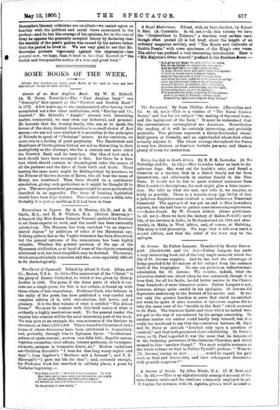The Christ of Cynewulf. Edited by Albert S. Cook. (Ginn
and Co, Boston, U.S.A. Cs. 6d.)—The manuscript of the "Christ" is the glory of Exeter Cathedral, to which it was given by Bishop Leofric in 1046. The poem, if the three parts of which it con- sists are a single poem, for this is not certain, is bound up with three others of less importance. Professor Cook, who believes in the unity of the poem, has here published a very careful and complete edition of it, with introduction, full notes, and a glossary. It is the first volume of what is entitled " The Albion Series." We must be content with this brief notice of what is evidently a highly meritorious work. To the general reader the inquiry into sources will be the most interesting part of the book. We may give as an example the remonstrance of the Saviour to the sinner, in lines 1,379-1,498. This is traced to Ctesarius of Arles (some of whose discourses have been attributed to Augustine), and, probably, through him to Ephraem Syrns. "Irridentium palmas at sputa suscepi ; acetum cum fella bibi ; fiagellis caesus, vepribus coronatus, cruel affirm, vulnere perfossus, ut to eripere- ris morti, animam in tormentis dimisi, ST.c." Modern imitations are Christina Rossetti's "I bore for thee long weary nights 'and days"; Jean Ingelow's " Brothers and a Sermon" ; and F. R. Havergars "I gave my life for thee"; and, curiously enough, for Proferisor Cook has searched in unlikely places, a poem by
Verlaine beginning :— •
"Mon Dieu m's SR : Mon fils II taut /Weimer. Tu vets
- Mon fianc percd, mon aunt qui rayonne et qui saigne Et men pieds oftenses que Madeleine habitue
De larmes, et mss bras douloureux sous le poi& De tee pechds, et mss mains.'"






































 Previous page
Previous page